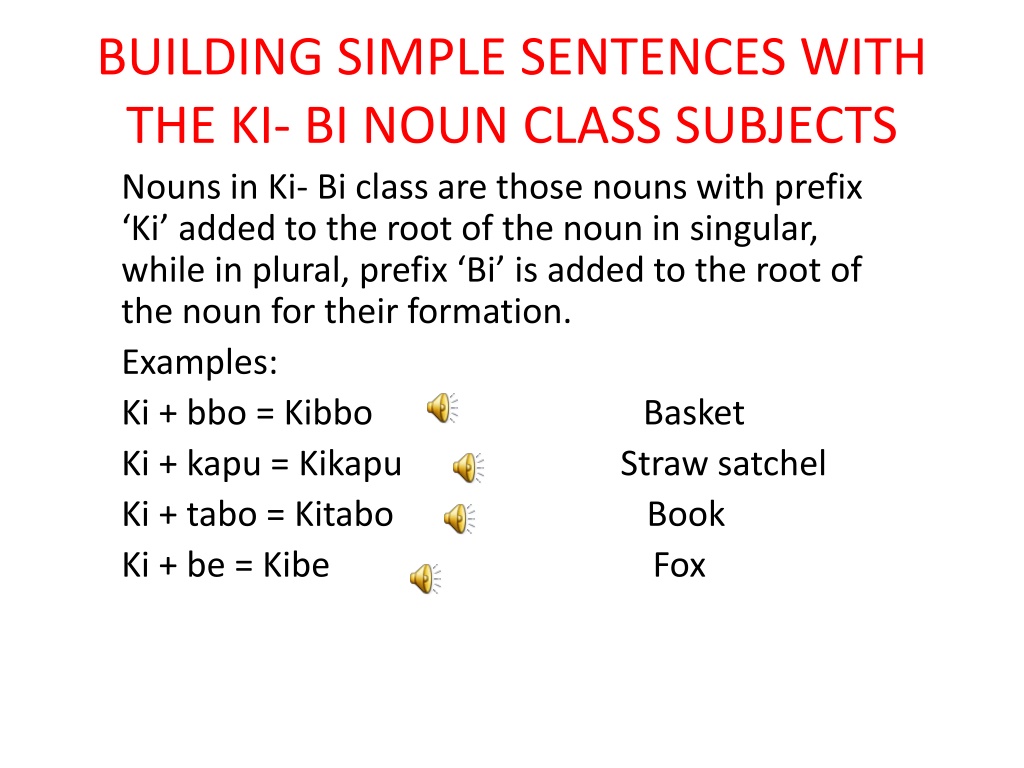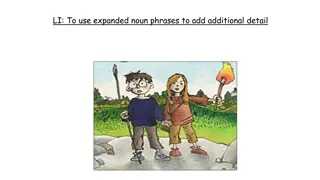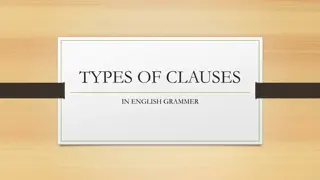Constructing Sentences with Ki-Bi Noun Class
Learn how to form simple sentences using nouns in the Ki-Bi class. Discover how to create plural nouns and construct subject-predicate sentences with the appropriate prefixes. Explore examples and rules for transforming singular nouns into plural forms. Master the use of Ki and Bi prefixes for effective communication in this noun class.
Download Presentation

Please find below an Image/Link to download the presentation.
The content on the website is provided AS IS for your information and personal use only. It may not be sold, licensed, or shared on other websites without obtaining consent from the author. Download presentation by click this link. If you encounter any issues during the download, it is possible that the publisher has removed the file from their server.
E N D
Presentation Transcript
BUILDING SIMPLE SENTENCES WITH THE KI- BI NOUN CLASS SUBJECTS Nouns in Ki- Bi class are those nouns with prefix Ki added to the root of the noun in singular, while in plural, prefix Bi is added to the root of the noun for their formation. Examples: Ki + bbo = Kibbo Ki + kapu = Kikapu Ki + tabo = Kitabo Ki + be = Kibe Basket Straw satchel Book Fox
Plural When turning the above nouns to plural, you add prefix Bi to the root of the noun. Bi + bbo = Bibbo Bi + kapu = Bikapu Bi + tabo = Bitabo Bi + be = Bibe Baskets Straw satchels Books Foxes
Forming simple sentences When forming subject- predicate sentences with nouns in the Ki- Bi class, you add prefix ki to the root of the verb. (E) kitabo ki + yulika Ekitabo kiyulika. -The book is getting torn. (E) kikapu ki + gwa - Ekikapu kigwa. - The straw satchel is falling. (E) kibbo ki + toba Ekibbo kitoba. -The basket is getting wet. (E) kibe ki + kaaba Ekibe kikaaba. -The fox is shrieking/ screaming.
Plural When you change the subjects to plural, you will have to add prefix bi to the root of the verb. Examples: (E) bitabo bi + yulika Ebitabo biyulika. - The books are getting torn. (E) bikapu bi + gwa - Ebikapu bigwa. - The straw satchels are falling. (E) bibbo bi + toba Ebibbo bitoba. - The baskets are getting wet. (E) bibe bi + kaaba Ebibe bikaaba. -The foxes are shrieking/ screaming.
Note: When a noun root begins with vowel a , the Prefix ki + a becomes kya Example: Ki + angwe = Kyangwe Ki + alo = Kyalo When you turn them to plural, bi the plural prefix + a becomes bya Bi + angwe = Byangwe Bi + alo = Byalo Ebyangwe bikuuta. Sponges scrub. Ebyalo bikyuse. Villages have changed. - Sponge - Village - Sponges - Villages























